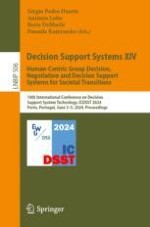This book constitutes the proceedings of the 10th International Conference on Decision Support Systems Technologies, ICDSST 2024, held in June 2024.
The EWG-DSS series of International Conference on Decision Support System Technology (ICDSST) is planned to consolidate the tradition of annual events organized by the EWG-DSS in offering a platform for European and international DSS communities, comprising the academic and industrial sectors, to present state-of-the-art DSS research and developments, to discuss current challenges that surround decision-making processes, to exchange ideas about realistic and innovative solutions, and to co-develop potential business opportunities. This year the main topic was: Human-Centric Group Decision, Negotiation and Decision Support Systems for Societal Transitions.
The 10 full papers included in these proceedings were carefully reviewed and selected from 29 submissions. They have been organized in topical sections as follows: Decision support tools and methods; and decision factors.
